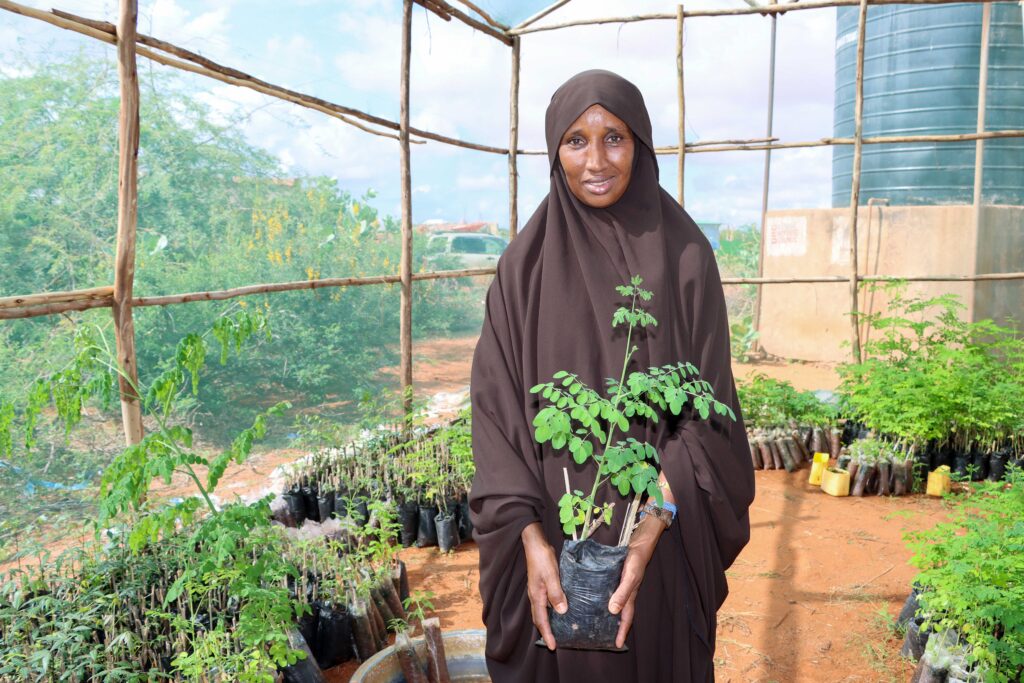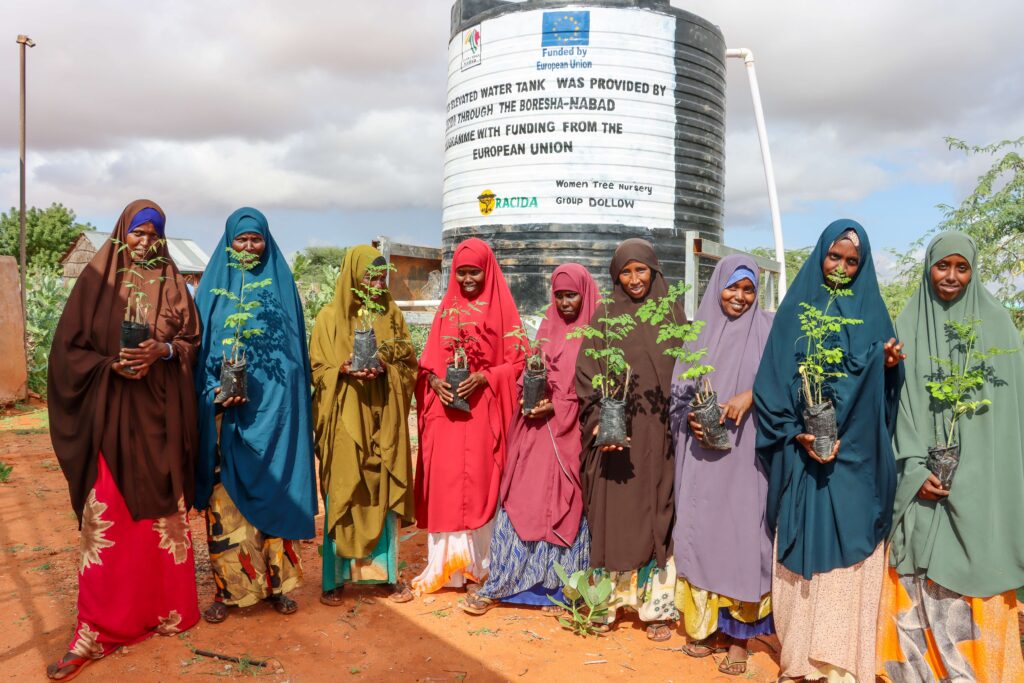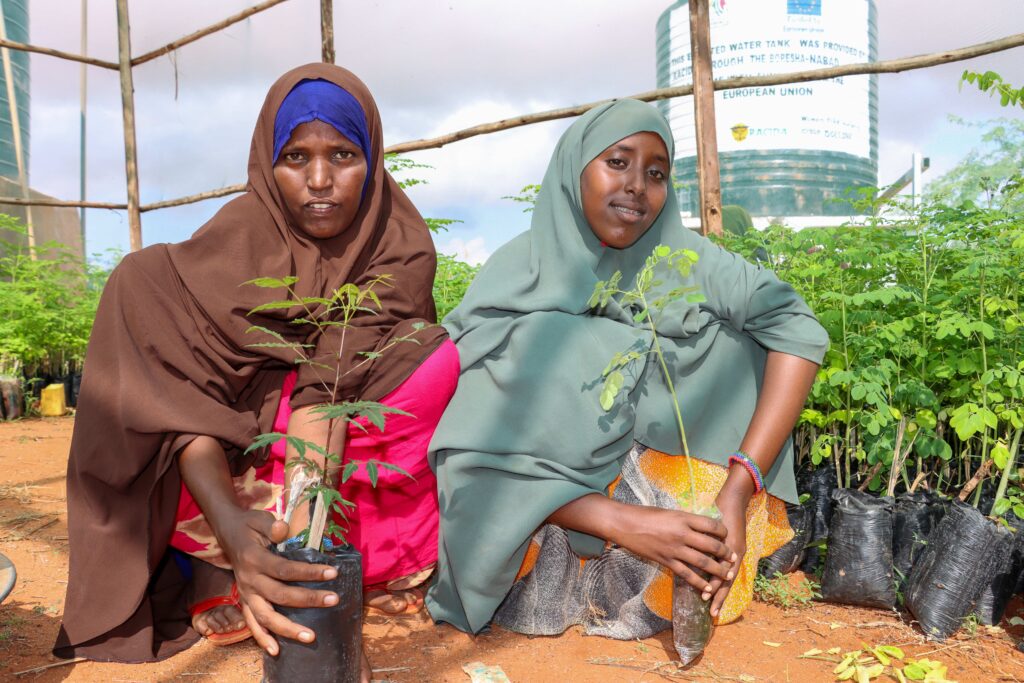
By Abdirahman Ibrahim | Consortium Communications Coordinator | BORESHA-NABAD
In Una Village, Dollow, Somalia, Saadia Duale, an environmental champion, is on a mission to transform Dollow District. As the leader of a BORESHA-NABAD-supported women’s tree nursery group, Saadia and 59 other women are driving a grassroots movement to restore degraded landscapes, respond to climate shocks, and unlock inclusive economic opportunities in Somalia’s borderlands.
Saadia’s group is offering a locally driven and sustainable alternative in a district facing severe deforestation, recurring droughts, and the loss of indigenous trees to widespread charcoal burning.
“Tree planting has become our inspiration for a better life. Our members are now able to feed their families and afford their daily needs through seedling sales. Much as the trees are beneficial to the environment, they’re also a lifesaver and a game-changer,” she says.
Rewiring Local Market Incentives through Green Livelihoods
Dollow’s environmental degradation has deep roots. With high unemployment and limited income-generating options, many men in the district have long depended on charcoal burning to support their families. Yet this coping mechanism has accelerated landscape degradation, flooding, and ecosystem collapse. Meanwhile, most women remain economically excluded, with few viable pathways to income generation.
This began to shift when BORESHA-NABAD, funded by the European Union and implemented by RACIDA Somalia, partnered with Saadia’s group. The programme supported the group with technical training in nursery management, seedling marketing, business skills, and climate-resilient agriculture. Investments also included four greenhouses and water tanks to facilitate year-round tree cultivation.


The group has cultivated and planted more than 7,000 tree seedlings, including lemon, papaya, moringa, and neem. Now retailing at $3–4 each, these trees generate consistent revenue and build a viable local market for sustainable forestry products.
Women as Catalysts in Systemic Environmental Change
“Since BORESHA-NABAD trained me, I’ve become a trainer of trainers. Women who were once idle at home are now active contributors to our local economy and environment. I am training more village women to nurture trees and earn income,” Saadia shares.
These women, many of whom are widows, single mothers, or from marginalised backgrounds, are now redefining gender roles and influencing household decision-making. The initiative is also contributing to a mindset shift among men.
“Most of our group members’ husbands were charcoal burners. But now they’ve become seedling sellers. With this income, our men have transformed into allies in environmental restoration. More trees mean more rain,” Saadia explains.
Enabling Market Systems for Scalable Environmental Impact
The nursery farms established with BORESHA-NABAD’s support have become local nodes for environmental restoration and women’s economic empowerment. Their success is not just in the number of trees planted but in the systems-level change they are sparking, improved household income, reduced dependence on extractive livelihoods, and increased community ownership of solutions.
“With every tree we plant, we’re not just protecting the environment, we’re transforming lives,” says Saadia. “Today, many people in Dollow face drought, deforestation, and joblessness. But through this initiative, we’re creating new livelihoods and showing that change is possible.”
Saadia and her group aspire to double their efforts in the months ahead and plant thousands more trees, perhaps even a million. As a group leader, she is determined to become a national model for climate adaptation and women-led resilience.
“Women are nurturers, and now, we commit to double our efforts in nurturing the land,” Saadia concludes.
Read More Stories Below
- Inside Community-Led Tree Planting Campaign Drive in Dollow and Beled-Hawa
- The Rise of Sustainable Tree-Based Economies in Somalia’s Borderlands
- From Survival to Strategy: How Dollo-Ado Women Are Building Financial Resilience through VSLAs
- Bridging Markets, Strengthening Farmers: The Story of Mohamed Issack Amin
- Nafisa Mohamed: Breaking Barriers in Veterinary Care